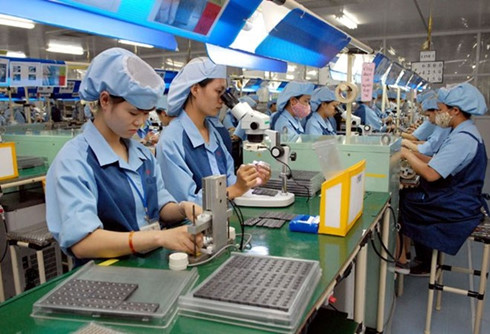Weak productivity putting pressure on companies
- Best 50 listed companies in Vietnam honored
- London business networking group tours HCM City
- Business community towards sustainable development
Most recently, the American Chamber of Commerce in Vietnam (AmCham) has criticized their competitiveness, having gone so far as to say it threatens their ability to participate in global supply chains.
Labour productivity, or the amount of goods and services employees produce per hour worked, continues to be one of the lowest of the 10-member ASEAN bloc, with the International Labour Organization (ILO) estimating that efficiency in Singapore is nearly 15-fold greater.
 |
The ILO analysis found that even when benchmarked against their counterparts from middle-income ASEAN countries Malaysia and Thailand, Vietnam workers lag woefully behind as well.
The continual shortcomings hinder the economy’s ability to lift Vietnamese living standards, says Vu Hoang Ngan from the Hanoi National Economics University.
Stronger productivity boosts corporate sector profits, giving companies more money to pay their workers.
In order for the nation to effectively integrate into the global economy, it is essential for local businesses to improve worker productivity along with worker wages and win in the competition process.
Alarm bells have been ringing for a few years now about a productivity gap between Vietnam and its regional neighbours and these concerns are linked in large part to lack of employable skills of postsecondary education graduates.
Fundamentally, says AmCham, there are significant quality issues in Vietnam’s postsecondary education system training that presents far too many ongoing challenges in terms of employability of its graduates.
AmCham had been looking for stronger competitiveness growth that in turn could translate to higher wages and in turn improved domestic demand in the nation’s retail markets as a sign the domestic economy is strengthening.
But the latest figures continue to show that wage compensation is outrunning productivity, result is an acceleration in labour costs per unit of output, not a good sign for an economy bent on becoming a global manufacturing hub.
Corporate profits are being squeezed as a result, and the worry is that transnational companies will start shifting their foreign direct investment elsewhere in the globe to places where they get more productivity from the workforce.
Already transnational companies have slowed hiring in Vietnam.
Priyanka Kishore, an economic advisor from the Institute of Chartered Accountants in England and Wales, tried to put the best face on the problem by saying he was, in effect, cautiously optimistic about the prospects for more rapid future productivity growth.
As for innovativeness, Mr Kishore, says he is also optimistic the pace will pick up and likewise readily bear fruit more in a stronger economy.
However, the stark reality is that the Vietnam economy needs skills – English skills, IT skills, and targeted training for a wide range of occupations and industries to boost the dismal worker productivity levels.
If the problems aren’t properly and timely addressed, says AmCham, the nation’s economic growth will without question, continue to suffer.

